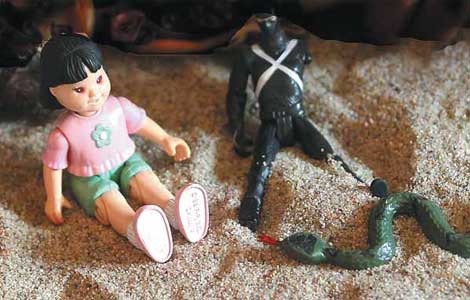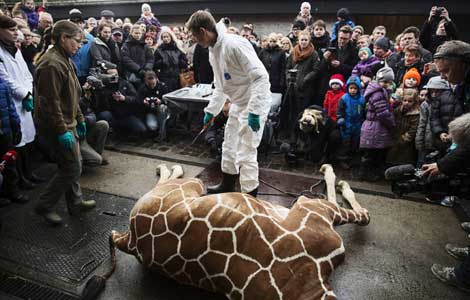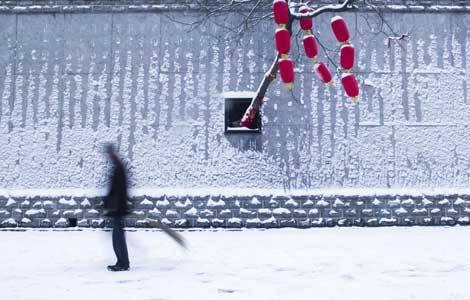Action needed to halt bird flu, experts warn
Updated: 2014-02-11 01:45
By Wang Qingyun (China Daily)
|
||||||||
Drastic changes are needed in both the poultry industry and consumer habits to help prevent new cases of bird flu and the mutation of its viruses, according to health experts.
In January, 127 people were diagnosed as infected with H7N9, a type of bird flu virus, 31 of whom died, the National Health and Family Planning Commission said on Monday.
"The main cause for the large number of new cases recently is that people are exposed to poultry more easily, as they eat more poultry around the Spring Festival,"said Shu Yuelong, director of the Chinese National Influenza Center, at a news conference on Monday.
The main channel for the transmission of the virus to humans is still close contact with live poultry, he said.
Also, a recent report by British science magazine New Scientist further highlighted the importance of changing the crude methods of raising and selling poultry.
"H7N9 virus has got part of its genetic makeup from H9N2,"said Yao Hangping, a researcher with State Key Laboratory for Diagnosis and Treatment of Infectious Diseases, confirming the report by New Scientist.
"H9N2 is an important chemical reactant in producing H7N9,"he said. "The virus is extremely common among chickens, so there is a high likelihood of it forming a hybrid with other type of flu virus.
"The most effective way to prevent the reassortment of genes is keeping poultry together in an enclosed farm. This is why we haven’t found H7N9 in large-scale poultry farms,"he said.
He said that poultry should be raised and butchered in an enclosed area to reduce the chances of genes being swapped between flu viruses.
Also, live poultry markets should be closed because the risks of different viruses hybridizing there are high, he said.
H9N2 doesn’t cause serious symptoms in chickens, but the fact that it can merge with other subtypes of flu virus to form new viruses means it should be monitored closely, said Shu, director of the Chinese National Influenza Center.
Also, the poultry industry should gradually abandon the free-range methods of raising poultry, tighten the tests on biosafety at farms, and sell processed chickens instead of live ones to stop the virus from spreading to humans, he said.
"Chinese people must change their tradition of insisting on buying live poultry. Frozen chicken doesn’t differ from live poultry in terms of nutrition,"Shu said.
"If the poultry industry cannot enhance its techniques to control the spread of viruses among poultry, it should find out ways to keep live poultry products away from consumers — such as setting up a barrier made of glass so that consumers can pick the animal they want without touching it,"said Feng Zijian, deputy director of the Chinese Center for Disease Control and Prevention.
Most Viewed
Editor's Picks

|

|

|

|

|

|
Today's Top News
Kerry seeks to 'rule out' possibility of conflict
Official cars to be auctioned in NE China city
Joint operation ensnares poachers
Family-raised poultry rises as new H7N9 source
China's largest private charity elects new chiefs
Sanya orders ban on naked beachgoers
Test to predict corrupt tendencies
Li hears opinions on govt report
US Weekly

|

|












